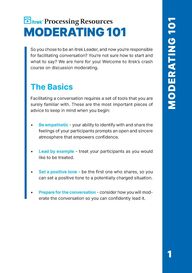
Return to flip book view
Message MODERATING 101 Processing Resources MODERATING 101 So you chose to be an itrek Leader and now you re responsible for facilitating conversation You re not sure how to start and what to say We are here for you Welcome to itrek s crash course on discussion moderating The Basics Facilitating a conversation requires a set of tools that you are surely familiar with These are the most important pieces of advice to keep in mind when you begin Be empathetic your ability to identify with and share the feelings of your participants prompts an open and sincere atmosphere that empowers confidence Lead by example treat your participants as you would like to be treated Set a positive tone be the first one who shares so you can set a positive tone to a potentially charged situation Prepare for the conversation consider how you will moderate the conversation so you can confidently lead it 1
MODERATING 101 Get it going Remember to smile be positive make eye contact give recognition and most importantly keep asking conversation stimulating questions Conversation stimulating questions sometimes called open ended questions show interest in the thoughts feelings and interests of others Open ended questions often begin with question words how what and why Refrain from close ended questions such as Did you learn anything new that quickly end the conversation with a yes or no response Instead ask What did you learn Avoid the biggest conversation ender How s it going the most frequent response of course is Okay Be wary of leading questions that indicate a specific opinion or view For example rather than ask What did you learn about Israel s right to exist you might say What did you learn about Israel To encourage even the shyest participants to take part in group conversations use the conversation stimulating questions we provide or use your itrekTalk Cards for guidance 2
MODERATING 101 The Next Level Active Listening Active listening is part of asking good questions It is a skill leaders should master Unlike critical listening an active listener is not trying to evaluate the message and offer their own opinion but rather make the speaker feel heard and validated Remember the goal of an active listener is to allow the participants to share reflect and process their experiences Respectfully give the speaker time to share their response fully Allowing someone the time and space to talk shows empathy and understanding Plus it gives you time to reflect and formulate your next question Allow wait time before chiming in Active listening helps establish trust shows empathy for others and fosters psychological safety Reinforce your role as a Leader by being a thoughtful listener Ask questions seek clarification and encourage others to share their perspective 3
MODERATING 101 Here are six best practices for active listening 1 Be attentive Pay attention to what participants say not what you want to say 2 Withhold judgment Active listening requires an open mind 3 Reflect and paraphrase Don t assume you understand what your participants are trying to convey 4 Clarify and ask questions Don t be shy about clarifying questions 5 Summarize Restate key themes to solidify your grasp of the participants point of view 6 Share Introduce your ideas feelings and suggestions so you are also understood To read more about best practices for active listening scan the QR code 4